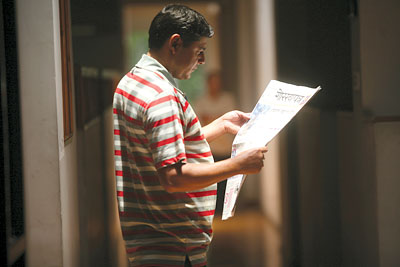 |
Early this month, Gorkhapatra marked its 110th year of publication without much fanfare. Started as a weekly pamphlet to propagate the supposed virtues of Rana rule, Gorkhapatra has remained the trusted mouthpiece of the government. The tone and tenor of the paper's content changes with every change of guard at Singh Darbar.
However, since the Constituent Assembly elections two years ago, Gorkhapatra has acquired a somewhat different image. It's now one of the least biased newspapers in the country.
Part of the relative neutrality of this government publication can be attributed to the survival instinct of its employees. With a hung legislature, there is no way of knowing who is going to head the Ministry of Information and for how long.
But Gorkhapatra's semblance of impartiality owes more to the stridently anti-Maoist tone of the private press. The government mouthpiece may not boast of accuracy, balance and credibility, but it has no reason to fear a Maoist takeover, and can therefore cover their side of the story as well.
With profit and prestige as their primary motives, partisanship comes naturally to the proprietary media. Paradoxically, that's precisely why they have to appear to be independent. Without the reputation of being fiercely free and fanatically fearless, the media cannot claim to be the watchdog of public interest, and will lose its influence the moment it is perceived as an apologist for the status quo.
The Four Theories of the Press of the early sixties sought to explain authoritarian, libertarian, responsible, and totalitarian methods of media operation. The state had to chose between collusion (libertarian and responsible) and control (authoritarian and totalitarian) models to manipulate the media according to its own character.
The seventies saw the emergence of the lapdog press as the Cold War took hold. In the anti-Soviet camp, freedom of the press implied supporting whichever dictator had been propped up by the West as an essential evil. In Soviet-supported regimes, any journalist who didn't support the government was merely a running dog of imperialism.
During the eighties, collaborative journalism emerged as the favoured method of managing the media. Its strictures were laid out by Lee Kuan Yew, who declared the government would not allow the media, "to assume a role in Singapore that American media play in America, that is that of invigilator, adversary, and inquisitor of administration." According to the doctrine of collaborative journalism, the state knows what is good for the people and the media's job is merely to magnify the state's achievements.
The commercial media, in cahoots with the leading political parties of the day, began to play an important role in decision making after the disintegration of the USSR. The trend proved to be so strong that it could now call itself a journalism of national consensus. The mainstream media agreed about everything that it decided was in the national interest. The rest were deviant and subversive
Once the Maoists exited government, the mainstream media in Nepal decided to support the successor coalition. While regular news reporting has continued apace, there seems to be a reluctance to hear, see or speak out against the anti-Maoist coalition.
The extent and scale of deforestation in the Tarai, for instance, is eerily reminiscent of the pre-Referendum devastation wrought to ensure the survival of the Panchayat regime. Law and order in the country has all but collapsed. Industrialists openly threaten to withhold taxes. Diplomats dictate terms undiplomatically. Despite mounting evidence of acts of omission and commission on the part of the current government, there is deafening silence on the media front.
It's the mortal fear of a Maoist takeover that has transformed the Nepali media into the willing accomplices of the government. Complicity journalism is Nepal's media contribution of the decade. Ironically, state-controlled media has been the honourable exception for once.
Magic wand, Dhruba Simkhada
Resurrection, deconstructed, Prashant Jha
Revisiting Crapmandu, Rabi Thapa
Professionalism and transparency, Artha Beed
M�nage � trois, Ass



